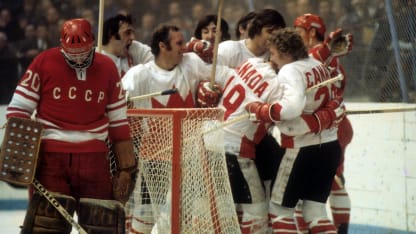Canada rallies from three one-goal deficits, but the Soviets score twice to take a 5-3 lead after two periods. Goals by
Phil Esposito
and
Yvan Cournoyer
get Canada even at 5-5 with 7:04 remaining in the third. With time running out, the Soviets are preparing to claim victory in the series, which with a tie would end 3-3-2, by virtue of having scored one more goal.
But Esposito picks up an errant pass from Cournoyer and pokes the puck toward goalie Vladislav Tretiak, who makes an easy save. However, no one picks up Henderson after he's tripped and crashes into the end boards. Henderson gets to the front of the net, shovels the puck at Tretiak and then
flips the rebound into the net with 34 seconds left
.
When the final buzzer sounds, Canada has its third straight victory and
wins the series 4-3 with one tie
.
The series is a watershed moment for hockey. The Soviets' speed and skill announce to the world that they don't have to take a back seat to the NHL or anyone else. But Canada teaches them a few lessons about heart, desire and the role of emotion.
"Legendary Soviet coach Anatoli] Tarasov said, 'We can skate with the Canadians. Our skill level is there. We can shoot as well as they do. The one advantage they have is their spirit,'"
[Henderson says
. "I believe that's what the separation was. We were able to dig down and do something that they weren't able to beat."
MORE MOMENTS
1926: The New York Rangers, preparing for their first NHL season, acquire center
Frank Boucher
in a trade with Vancouver of the Western Hockey League for $15,000. Boucher becomes one of the Rangers' first stars, helping them win the Stanley Cup in
1928
and
1933
. He also wins the
Lady Byng Trophy
so often (seven times in a span of eight years) that Lady Byng, the donor of the trophy, gives him the original and donates a new one.
1929:The NHL makes a major change to the way the game is played by allowing forward passing in all three zones. Prior to the rule change, teams are not permitted to make forward passes in the attacking zone. The rule change provides a major boost to offense around the League.
1979:The Minnesota North Stars sign forward
Dino Ciccarelli
, who goes undrafted after breaking his leg during his final season of junior hockey. Ciccarelli sets an NHL playoff record for rookies by scoring 14 goals in 19 games in 1981. He finishes his NHL career with 1,200 points (608 goals, 592 assists) and is
inducted into the Hockey Hall of Fame
in 2010.

